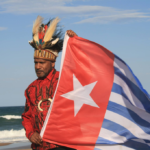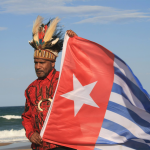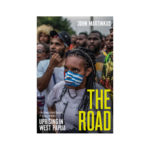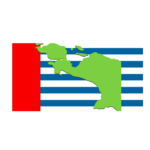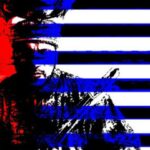Ecocide and Genocide Escalates in West Papua: Interview with ULMWP’s Benny Wenda
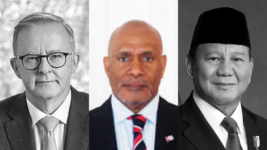
Following his re-election as Australian PM Anthony Albanese paid a visit to relatively new Indonesia president Prabowo Subianto in Jakarta, with foreign minister Penny Wong and home affairs minister Tony Burke in tow. This is a rite of passage for a PM following an Australian election, and the nation can rest assured that he, just like his predecessors, avoided any mention of West Papua.
Indeed, Albanese would have been extra cautious when it came to all things West Papuan in speaking with Prabowo, as the former Kopassus general gained his notoriety for the brutal manner in which he butchered and oppressed the occupied peoples of East Timor prior to moving on to occupied West Papua to again punish an Indigenous people for being on their own land.
Since coming to power in October last year, Prabowo has continued the now eight-year-old attacks on the highland areas of West Papua that his predecessor Joko Widodo launched in Nduga Regency in 2018, and recent months have seen an escalation in aerial attacks upon West Papuan people living in villages in Puncak Regency, who were either killed or displaced in their ancestral homeland.
Our PM did conduct one interview whilst in Jakarta, where Papua was raised twice in terms of rumours that Russia wants to station warplanes in the region, but Albanese assured the reporter that Indonesia had made clear it would not be progressing the Russian request, and he added that the alleged war criminal he’d been liaising with spoke favourably of strengthening ties with our nation.
The Act of No Choice
As the Netherlands was ending its colonial occupation of West Papua, the 1962 New York Agreement was established that saw the region signed over to Indonesia as an interim administrator in 1963, on the proviso that Jakarta hold a referendum to allow the people of West Papua to decide on whether they wanted to remain under Indonesian control or have their independence.
Jakarta then staged the UN-brokered Act of Free Choice, a 1969 referendum on self-determination, which involved the Indonesian military choosing only 1,026 West Papuans to vote on independence, and under threat of violence, all of the men unsurprisingly voted to stay with the nation that was holding a gun to their heads.
The struggle for West Papuan independence began in the 1960s and continues with strength to this day. In January 2019, West Papuan freedom movement leader Benny Wenda presented the UN Human Rights High Commissioner with the West Papuan People’s Petition, which calls for a new internationally supervised vote on self-determination that’s legitimate this time.
Wenda has led the West Papuan freedom movement for decades. In December 2020, the West Papua provisional government was formed, which involved the establishment of an entire governmental structure on the ground within the Melanesian territory, and Wenda has been appointed president of the nation of West Papua.
Sydney Criminal Lawyers spoke with West Papuan provisional government president Benny Wenda about his hopes that our prime minister will raise the ecocide and genocide taking place in the occupied region with Prabowo, as well as the recent escalation in attacks in the highlands, and the great strides that the West Papuan freedom movement has made over recent years.
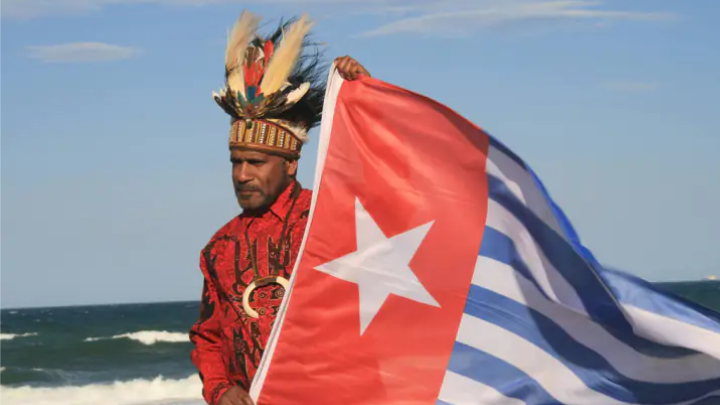
Following his recent re-election, Australian PM Anthony Albanese’s first official duty was to travel to Jakarta to meet with Indonesian president Prabowo Subianto. And while Australian PMs meeting with the Indonesian president post-election is normal practice, so is the neglect of any talk about occupied West Papua.
Mr Wenda, what are your thoughts on Australia’s long-term neglect to raise the issue of West Papua with successive Indonesian presidents?
This is frustrating because Australia and New Zealand are the big powers in this region, and they have an obligation to protect the Pacific and Melanesian peoples. But what we have seen for the past 50 or 60 years is Australia has ignored West Papua.
And bear in mind, during the Second World War, our ancestors were on the frontline helping Australia in West Papua. They were our ancestors, and we are the children of those people who helped, and now we are in crisis, Australia is ignoring us.
Australians are now enjoying that freedom that our ancestors helped secure on the frontline by preventing the Japanese from taking over Australia.
So, Australia needs to help West Papua now and talk about the human rights situation in West Papua.
But Australia and New Zealand have been ignoring this human tragedy that involves over 500,000 West Papuans having been killed by Indonesia.
Indonesia is committing genocide in West Papua, just like it did in East Timor.
We are now talking about the Middle East and what is happening in the Ukraine war, but what about the 60 years’ war here on Australia’s doorstep?
That is the question for me and my people because I have been screaming about this for all these years at the Melanesian Spearhead Group (MSG) meetings or at the Pacific Island Forums, and Australia is sitting right there. I am watching them, and they’re always ignoring me.
So, I hope during this trip, the prime minister has raised this issue, because this is Indonesia not only committing genocide but also ecocide in West Papua.
Indonesia is destroying our rainforest. It is building the Trans-Papua Highway, for what?
The Trans-Papua Highway is destroying the rainforest. This island has the third largest rainforest in the world and is the third largest preserver of CO2.
Recently, there have been further ongoing attacks by the Indonesian military upon villages in highland regions. This time the attacks took place in Puncak Regency in the central highlands, and it involved airstrikes on villages.
Can you talk about what is happening?
These were Indonesian airstrikes that saw bombing in the area. This has been of rising concern for two months now. This has happened in Ilaga and Intan Jaya. People have been scattered. Some have been killed. The Indonesians have been using drones on ordinary people.
Some people, women and children, are going to their gardens and suddenly, the Indonesian army are stopping them and searching them because they are suspicious they are freedom fighters. Also, three days ago, one of the pastors was killed.
When Indonesia is bombing, they’re using modern weapons. This is what happened when I was a child, and it brings me memories of that.
We spent years in the bush, from 1977 to 1982. I grew up in the bush. And this is again happening right now.
There has been an escalation in attacks in the highlands of West Papua which commenced in Nduga Regency in late 2018. Is this part of that same campaign?
That is correct. Indonesia is trying to control our entire territory. But we didn’t expect this bombing across the highlands.
Indonesia started these attacks in 2018 in the highlands. So, it is almost eight years that Indonesia has been conducting this miliary operation across West Papua.
They’re trying to control this territory and about 100,000 people have been displaced. For example, in Intan Jaya, Puncak Jaya and Maybrat, these people are now in the bush.
This is why Indonesia will not let the UN High Commission visit West Papua. But this has been called for by the Pacific Island Forum, the MSG and the Organisation of African, Caribbean and Pacific States.
Even 85 countries, including the UK, the Netherlands and Spain, have called for the UN High Commissioner to visit West Papua but Indonesia has not allowed this to happen, and it has been eight years now.
Prabowo Subianto became Indonesian president last October. The former Indonesian general had a close to 30 year military career commencing in 1970, which saw him gain notoriety as an officer in Kopassus (special forces), due to the particular barbarity he subjected the occupied regions of East Timor and West Papua to.
What has it meant for West Papuans to bear witness to his coming to power? What do you think it will mean for West Papua going forward with Prabowo as the head of Indonesia?
We don’t have any future with this president. He had been a wanted man in the West. This included Australia, the UN and the United States all banning him. Prabowo committed war crimes in East Timor and West Papua.
So, that’s why there is no future for West Papua with Prabowo. I already made a statement before his election, that there was great fear. He is an aggressor to my people.
He is sending thousands of troops to West Papua. But there is no modern war going on. West Papuans only have traditional weapons to defend themselves. In particular the West Papuan military wing is trying to defend their people, their land, their communities and themselves.
There is nowhere to go. Indonesia is illegally occupying us, that is why they are trying to control the region. And that’s why there are concerns about the current president because he was a general under the Suharto regime. He has had a lot of experience.
Prabowo could bring solutions, but instead there is more suffering for my people.
Is Prabowo now picking up deforestation operations in West Papua?
The deforestation is massive, and the military are involved. For example, in Merauke, almost 2 million hectares are being cleared for food production, and it is protected by the Indonesian military.
More military is now coming into Merauke, and the local people have been protesting day and night. They’re even going to Jakarta to protest. They are screaming and begging for Indonesia not to destroy our forest because our forest is like our supermarket.
Our forest is our survival. But they are destroying it. That is why I say that ecocide and genocide is happening in West Papua.
Anthony Albanese did hold a press conference in Jakarta on 15 May, and Papua was raised twice, but this had nothing to do with the occupation, rather it involved the rumours about Russian president Vladimir Putin wanting to station war planes in your occupied country.
What does it mean for the West Papuan people to see leaders of other nations discussing whether they can station war planes capable of firing long range missiles in your territory?
This is not Indonesian territory. Indonesia illegally occupies it. Russia should not be there, because it is our territory.
West Papua is a timebomb. This is what we have been telling the Australian government for a long time.
We have told Australia that sooner or later, we will have to fight because our sovereign state has been stolen by Indonesia, and you cannot allow foreign countries, like Russia, to build a base on Biak Island because that is our sovereign territory.
This is illegal. It is illegal to let Russia build a military base. This is why we are against this, and we are reminding the Australian and New Zealand governments to support us and be a gatekeeper, before it is too late.
Lastly, Mr Wenda, recent years have seen a lot of progress in the Free West Papua Movement. There has been the West Papuan People’s Petition, the ULMWP formed a West Papuan provisional government in December 2020, and more nations than ever before are calling for West Papuan independence.
So, how is the struggle for West Papuan self-determination going?
We are confident. We are making a lot of progress. The petition is asking the United Nations to review what happened in 1969: the fraud referendum.
I delivered the petition to the C24 and then to the UN Human Rights Council and now they have this petition, that contains 1.8 million West Papuan signatures.
The United Liberation Movement for West Papua provisional government means that after all those years of it being promoted that we supported Indonesia from within have ended.
The provisional government shows that we are fighting for the liberation of our sovereign state that was stolen from us in 1961 and that we now want restored.
This was witnessed at the time by Australia, France, Britain, the Netherlands and also Papua New Guinea, as it was administered by Australia.
Now, we have announced our constitution, our government structure and our Green State vision. We’re showing the world that we are ready to run our own state, and there is no doubt about it.
We have presented ourselves to the world in this way, and the world is now becoming more confident to recognise our provisional government.


